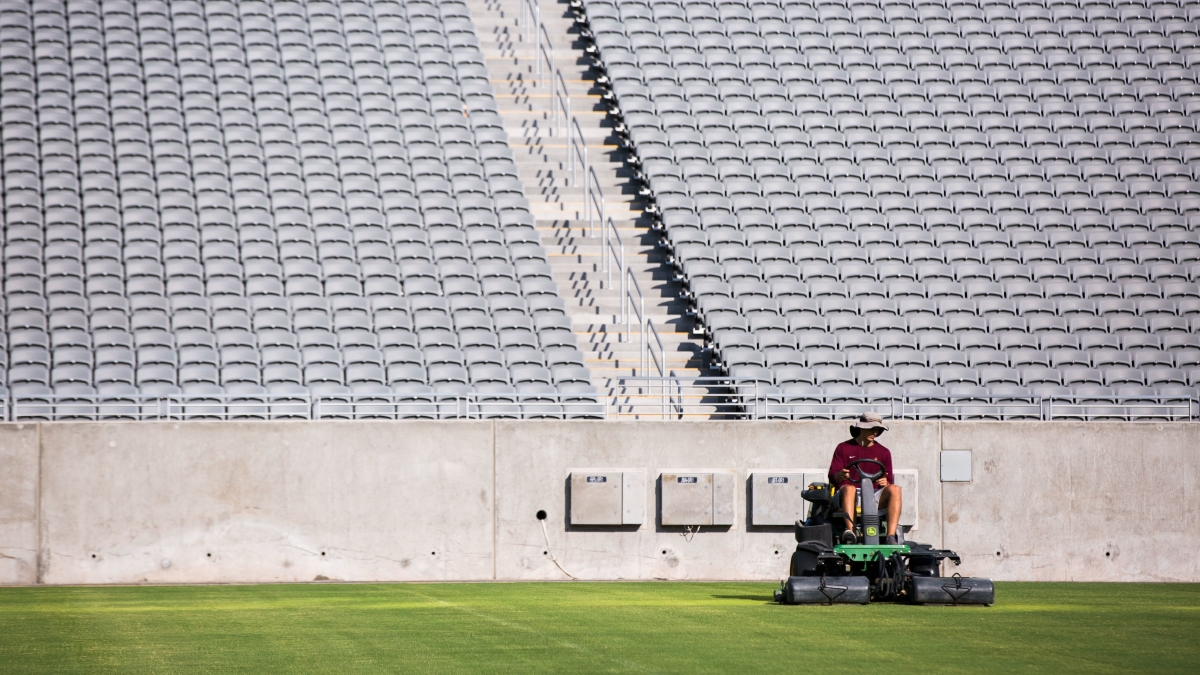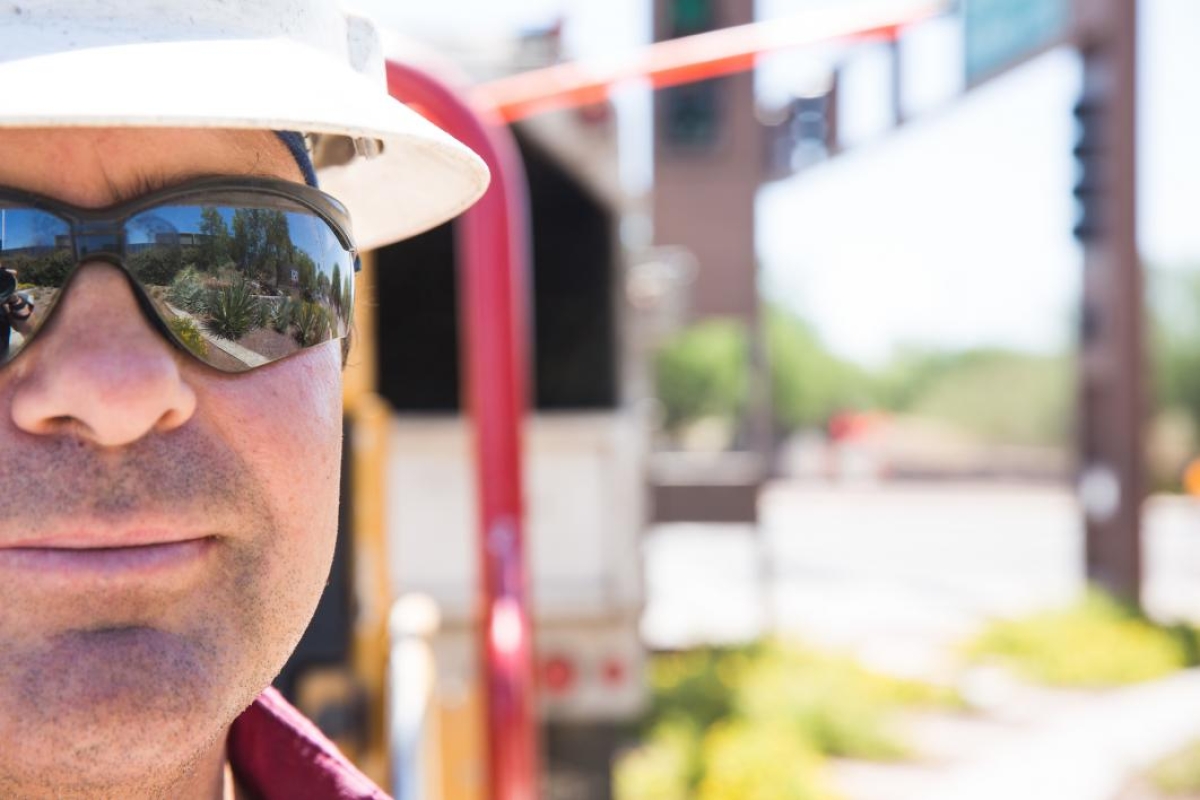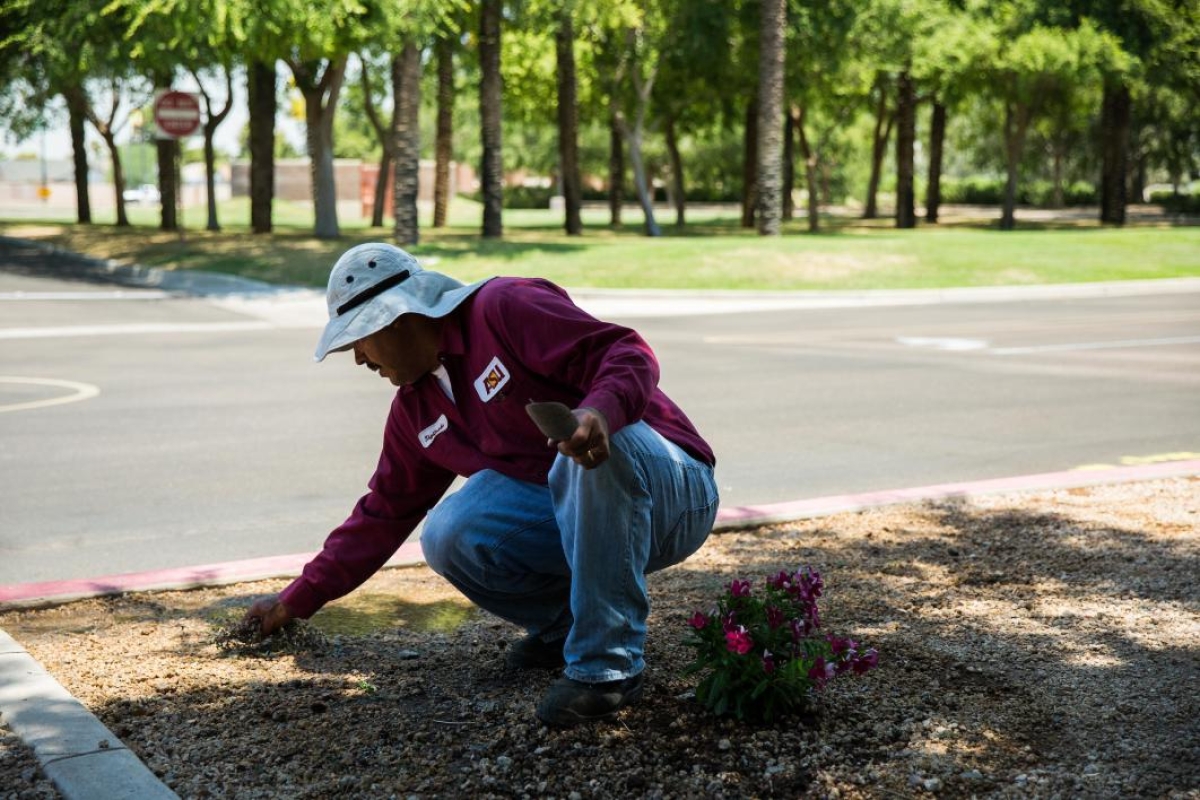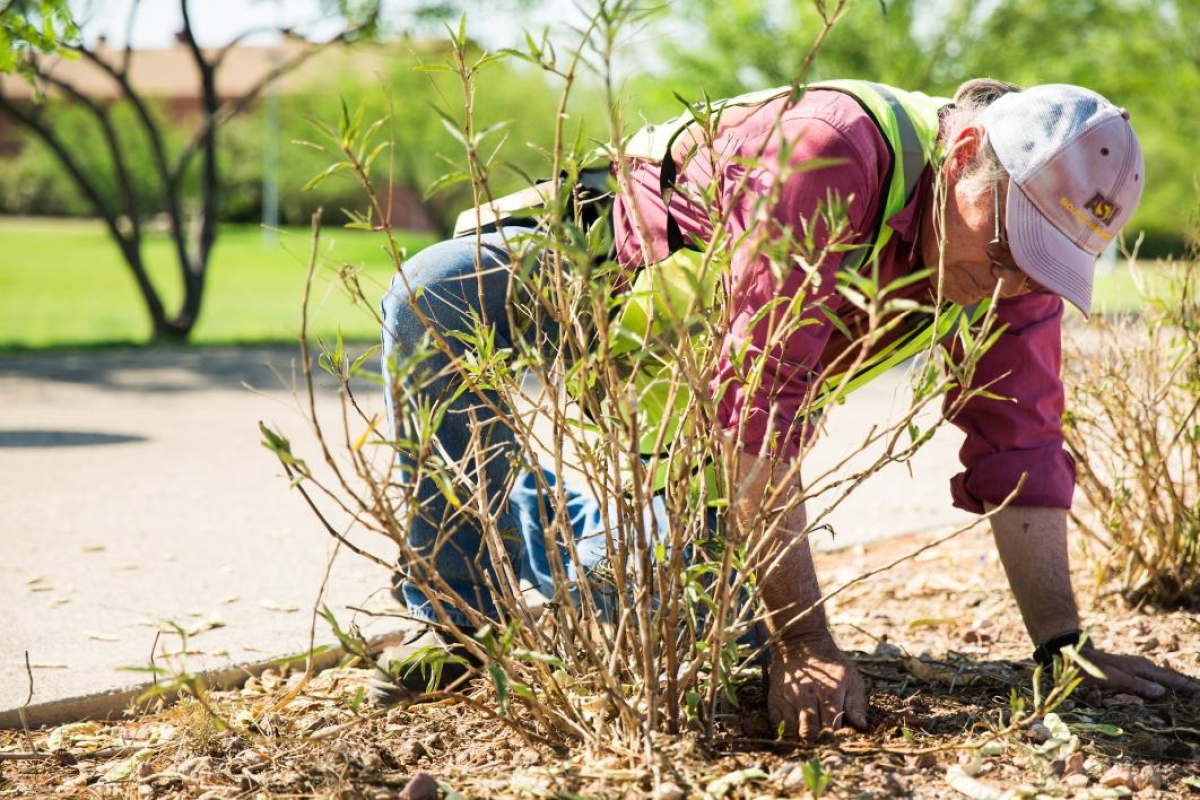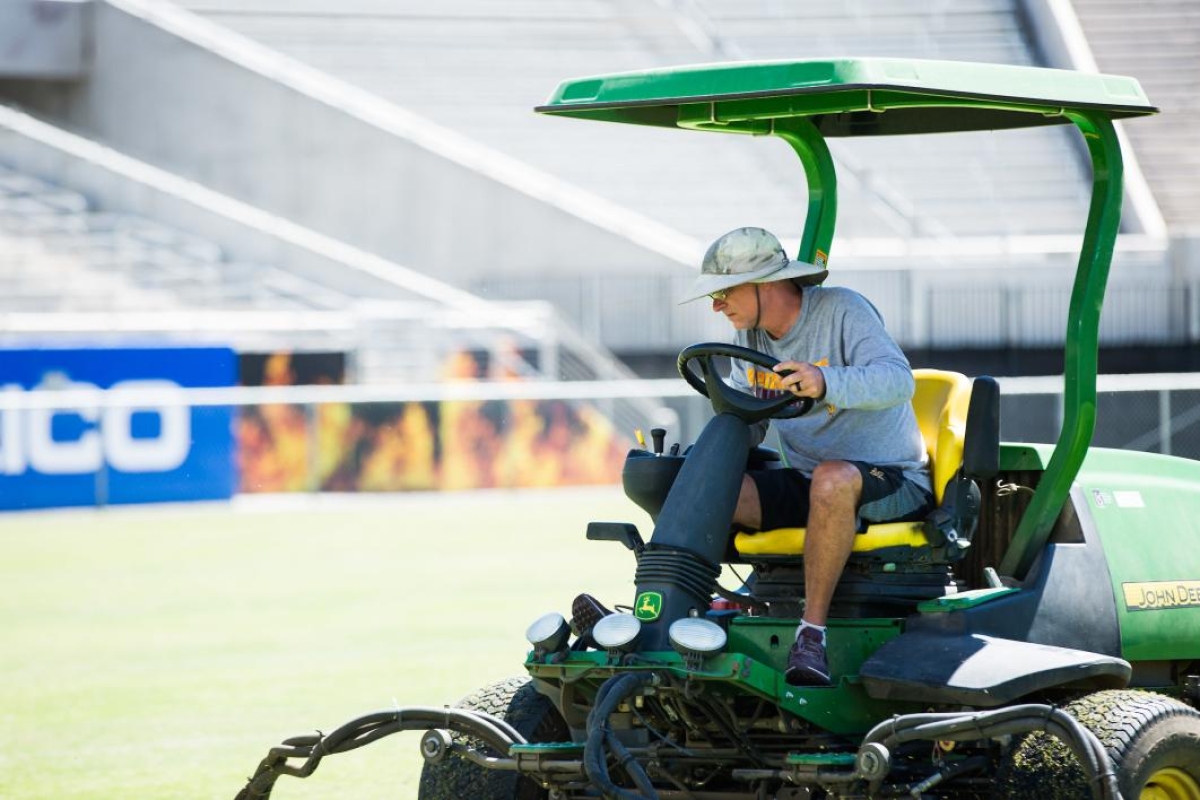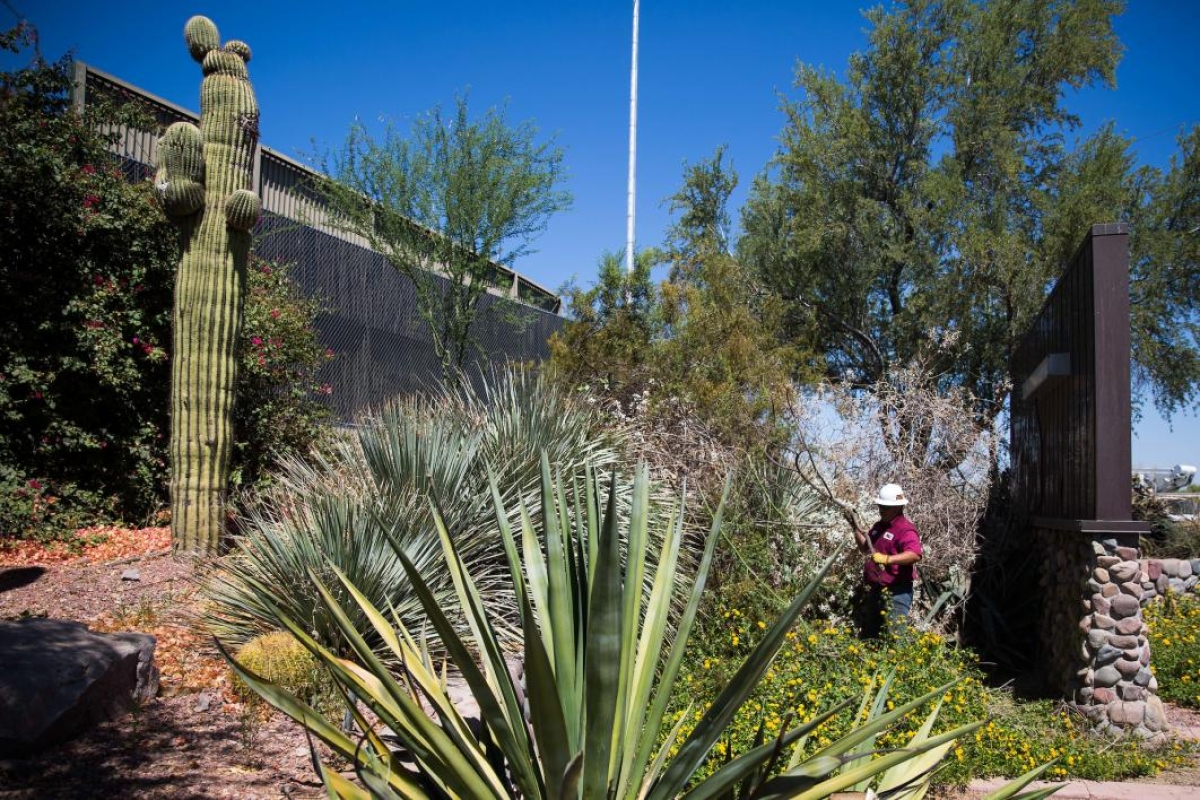It's a summer Monday morning and Brian Johnson is making his usual rounds.
The manager of Arizona State University's athletic grounds facilities has already inspected the school's soccer and lacrosse field and noted where some improvements could be made at the football practice facility.
Now he finds himself on the sidelines at Sun Devil Stadium, taking in the football team's skill development workouts. He receives a compliment from defensive coordinator Phil Bennett ("We've got to honor this nice-looking field and play like it.") and asks quarterback Manny Wilkins if the team can stay away from a certain area of the stadium.
The temperature in Tempe on this morning is already 91 degrees. There isn't a cloud in the sky — no protection from the desert sun that would eventually raise the mercury level to the mid-90s by day's end. But this is what locals refer to as a "good" day, one of just three in the month of June where the highs don't crack triple digits.
Because of the harsh summer sun, special measures have to be taken to protect the fields. Sometimes it's as simple as spraying fungicides to circumvent the potential of disease, but a daily mowing is also required for each field.
"The Bermuda grass just grows so fast," explained Johnson. "If you miss one day of mowing then it just takes that much longer the next time."
Whatever Johnson is doing must be working. Sun Devil Athletics has maintained one of the top grounds crews in the country for more than 30 years.
They are known for eye-catching mow patterns and pristine field conditions, and Johnson has helped prepare the past 20 Super Bowl fields. That number will rise to 21 next February when he returns to his home state of Minnesota to work Super Bowl LII. A member of the Sun Devil grounds crew has been present at the NFL's biggest game since 1996, when it was held at Arizona State's own Sun Devil Stadium.
"We take a lot of pride in our work," said Johnson, who has been on the crew at ASU for his entire professional career. "I didn't know anything when I started here, though. It was a lot of trial and error, but I got a lot of good advice from some people."
That good advice has led Johnson to the top of his team, which consists of four other full-time employees and three student workers. The students aren't huge fans of the heat but concede that it's a necessary evil that comes with the territory.
"All things considered, it's an awesome job," said Michael Klakulak, who graduated from ASU in May. "I love being around sports, and this allows me to experience the game atmosphere up close."
When asked about his grounds crew, head football coach Todd Graham is clearly impressed.
"We enjoy a world-class playing surface at Sun Devil Stadium," Graham said. "Johnson and his crew are so talented, we always know that our student-athletes will have the finest field in the country to play on."
Grounds Services keeps 3 campuses blooming all summer
While the athletics grounds crew manages the university's playing surfaces, the remaining 640 acres on the Tempe campus are maintained by the hard-working group from ASU Grounds Services. They also cater to the Polytechnic and West campuses.
Jimmy Mastalsz, the grounds supervisor at ASU's Polytechnic campus, said that because of the location's unique desert enviornment, it requires plenty of specialized work during the summer.
"In addition to the desert landscape, we have over 40 acres of an oasis grass area that we oversee," Mastalsz said. "We start making sure our irrigation system is working properly in May, and because we're putting more water on, a lot of those desert trees like to grow faster. Monsoon season and wind storms are also coming up, and we prepare for that by pruning all of our trees."
Meanwhile at the West campus, grounds chief Craig Danielson said that its smaller size and location provide some benefits.
"It's much smaller and totally self-contained," he said. "You have virtually no city streets to deal with, and there aren't as many students walking around."
But no matter the location, these crews also brave high temperatures to keep the campuses looking good throughout the summer.
"We'll try to take more breaks and stay indoors a little more, but the expectations don't change," said Robert Ferrera, ASU's lead mechanic.
When not going out on service calls across campus, Ferrera and the department's other mechanic spend their days looking over some of the university's 900 vehicles.
He said that all grounds-crew employees are required to go through a heat stress training, which provides information on what one can do to keep from getting heatstroke.
So, just how do these guys stay cool?
Taking advantage of shade, when available, is important. So is drinking water (sip, don't swallow) and Gatorade (always orange, Ferrera said).
Rob Vagle, who is now in his fourth year as a groundskeeper with the department's tree crew, likes to wet a bandana to keep his head refreshed. He also wears a light, cool undershirt beneath his standard uniform.
When possible, some members of the team will adjust their hours so they don't have to work in the afternoon sun.
For Ferrera, though, it's all worth it.
"The structure of the university is great because of how much they care about the employees," he said. "I've always compared working at ASU to working at Disneyland. It's just a wonderful place to be."
Top photo: Athletics ground facilities manager Brian Johnson works on ferti-slicing Frank Kush Field on the morning of June 22. Photo by Deanna Dent/ASU Now
More University news

New online Bachelor of Social Work program exceeding enrollment expectations
Social workers are in big demand.Citing U.S. Bureau of Labor Statistics figures, the National Association of Social Workers projected the profession will grow 7% by 2033, faster than the average for…

Miki Kittilson appointed dean of ASU's College of Global Futures
Miki Kittilson has been appointed dean of Arizona State University’s College of Global Futures, a unit of the Julie Ann Wrigley Global Futures Laboratory.“As we enter this next phase of…
Graduate College celebrates 2024–25 Outstanding Faculty Mentors
Each year, Arizona State University’s Graduate College celebrates faculty members who have demonstrated an unwavering commitment to mentoring and supporting graduate students and postdoctoral…


